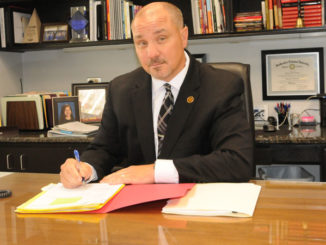
By Jeremy Alford and John Maginnis
With lawmakers working to plug holes in the state budget that takes effect July 1, a new amnesty program is on the move that could offer delinquent taxpayers much more in the way of waivers than originally projected.
The state is currently entering year two of it’s three-year tax amnesty program, which allows those with back taxes to pay up in exchange for lessened penalties and interest.
Last year’s amnesty period raised $382 million in cash by waiving 100 percent of penalties and 50 percent of interest. The 2014 program was supposed to drop down to 15 percent of penalties and no breaks on interest, but lawmakers are apparently eager to raise more money for a budget that’s brimming with shortfalls and at least a $50 million hole.
That’s why HB 663 by Ways and Means Chairman Joel Robideaux, R-Lafayette, is heading to the full House with amendments to increase the threshold to 67 percent for penalties and 33 percent for interest. The administration is hoping the changes will help raise in the neighborhood of $100 million for the state next fiscal year.
“We had to make these changes to help facilitate the budget process we find ourselves in,” Robideaux said. “Whether or not we collect $100 million, more or less, there’s no way to know. It gives the Department of Revenue the opportunity to make an amnesty program that’s attractive.”
While the Department of Revenue has not yet scheduled the 2014 tax amnesty program, it’s expected to be slated for the fall. Unlike last year’s two-month program, this year’s incarnation will be only one month.
Other changes to the 2014 program include installments. Rather than having to pay off their debt in a lump sum, this year’s program will allow for taxes to be paid off over the span of six months. The department is also asking lawmakers to give its negotiators an extra month to review taxes that are protested or disputed through the program.As Legislature drones on, university steps in
A House committee rejected legislation Tuesday that had been passed by the Senate to ban certain activities involving flying drones.
Just a few weeks ago, the Board of Regents voted to authorize an initial one-year program at the University of Louisiana at Monroe to create an unmanned aircraft research center.
While the two efforts appeared to be working at cross purposes, SB 330 by Sen. Dan Claitor, R-Baton Rouge, would have carved out an exemption for agriculture, which is also be the focus of the ULM program — clumsily named the Precision Agriculture and Unmanned Aircraft Systems Research and Applications Center. Monroe has a history with aviation start-ups, as the birthplace of Delta Air Lines.
According to the authorization plan approved by the Board of Regents, it’s estimated that 80 percent of commercial drone use in the nation will be in the agriculture field, with a $200 million impact in Louisiana during the first two years after the Federal Aviation Administration eases operating regulations.
Funding for ULM is expected to come from federal, state and private grants. Planned applications include overhead crop photography and crop spraying, with possible future uses for the cattle and timber industries, university officials say.
Claitor’s so-called DRONE Act would have prohibited, excluding some 18 categories, unmanned aircraft owned by the government or independent parties from surveilling or photographing private property.
The bill was opposed by several media outlets, who said journalists and others should have the ability to use the new technology.
Louisiana’s newspaper war continues
As The Advocate tries to encroach on The Times-Picayune’s public advertising business, other newspapers below I-10 are taking notice and doing what they can to protect their turf. HB 787 by Rep. Jeff Arnold, D-Algiers, allows The Advocate to bid on the same legal advertisements as the Picayune in Orleans and Jefferson parishes, even though the paper hasn’t been there for the required five-year waiting period.
When the bill went through the House Municipal Committee last month, an amendment was added by Rep. Taylor Barras, R-New Iberia, to tighten the language so that it applied only to Orleans and Jefferson.
He said he was contacted by representatives from The Lafayette Advertiser, which covers an area that The Advocate’s new publisher, John Georges has targeted as a growth market.
“They just wanted to make sure there would be no confusion. Some of the locals were contacting them and asking if the bill meant the legal and judicial notices would have to be turned into The Advocate. We just wanted to make sure there isn’t any confusion,” Barras said.
Another lawmaker told LaPolitics that interested parties in the Houma-Thibodaux region are following the debate closely, especially since it’s another market Georges has singled out in recent presentations on The Advocate’s future.
“What’s to stop them from going down there next?” the lawmaker said. “We used to never have to deal with these kinds of bills. Now they’re popping up every few years.”
Fixing agriculture liabilities
Just one step away from the governor’s desk are a group of bills that could lift a legal cloud hanging over state agriculture.
HB 878 by Rep. H. Bernard LeBas, D-Ville Platte, would set up assessments for rice growers for use by the Rice Promotion Board. Other bills dealing with rice research, soybeans and crawfish are advancing as well.
The current system by which the Rice Promotion Board ordered assessments was ruled invalid by the state Supreme Court in a class action suit brought by a faction of rice growers. According to Agriculture Commissioner Mike Strain, the lawsuit could lead to a $60 million exposure for the state for fees illegally assessed over the past 50 years.
In effect, the new assessments outlined in the bill would be voluntary because farmers could later be reimbursed.
While the bills, which are prospective, would not directly affect the lawsuit, Strain said, “I am very hopeful that the resolution of those bills, the fact that all sides have come together, will result in the lawsuits being dropped.”
They Said It
“I couldn’t get re-elected so I had the parliamentarian position created and got appointed to it. How you like that?”-Former state Sen. Tony Guarisco
“In Breaux Bridge, Louisiana, we just got CBs.”-Sen. Fred Mills, after fiddling with an uncooperative laptop




Be the first to comment